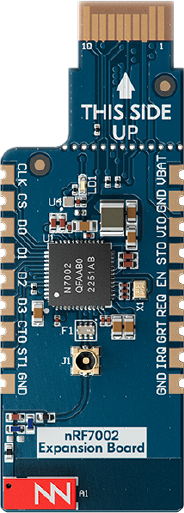Developing with nRF7002 EB
The nRF7002 Expansion Board (EB) (PCA63561), part of the nRF70 Series Family, can be used to provide Wi-Fi® connectivity to compatible development or evaluation boards through the nRF7002 Wi-Fi 6 companion IC. For example, you can use it with the Nordic Thingy:53, an IoT prototyping platform from Nordic Semiconductor.
You can also use the nRF7002 EB to provide Wi-Fi connectivity to the nRF54H20 DK and nRF54L15 PDK.

nRF7002 EB
The nRF7002 EB features a Printed Circuit Board (PCB) edge connector and castellated holes to provide Wi-Fi connectivity through the nRF7002 companion IC.
In case of the Nordic Thingy:53, the PCB edge connector connects nRF7002 to nRF5340, which acts as a host. For the pinout of the PCB edge connector, see nRF7002 EB PCB edge connector in the board’s Hardware User Guide. For information about how to connect to the Nordic Thingy:53, see Using nRF7002 EB with the Nordic Thingy:53, also in the hardware guide.
The castellated holes on the side of the board allow the EB to be used as a breakout board that can be soldered to other PCB assemblies. This way, you can provide Wi-Fi capabilities to develop Wi-Fi applications with another System on Chip (SoC), MPU, or MCU host. For the pinout of the castellated holes, see nRF7002 EB castellated edge holes in the board’s Hardware User Guide.
Pin mapping for the nRF54H20 DK and the nRF54L15 PDK
For nRF54H20 DK and nRF54L15 PDK, refer to the following tables for the pin mapping for these kits:
nRF70 Series pin name (EB name) |
nRF54H20 DK pins |
Function |
|---|---|---|
CLK (CLK) |
P1.01 |
SPI Clock |
CS (CS) |
P1.04 |
SPI Chip Select |
MOSI (D0) |
P1.05 |
SPI MOSI |
MISO (D1) |
P1.06 |
SPI MISO |
BUCKEN (EN) |
P1.00 |
Enable Buck regulator |
IOVDDEN (Not used) |
P1.00 |
Enable IOVDD regulator |
IRQ (IRQ) |
P1.02 |
Interrupt from nRF7002 |
GRANT (GRT) |
P1.03 |
Coexistence grant from nRF7002 |
REQ (REQ) |
P1.08 |
Coexistence request to nRF7002 |
STATUS (ST0) |
P1.07 |
Coexistence status from nRF7002 |
Note
Connect VIO to 1.8 V and VBAT to 3.6 V and GND.
nRF70 Series pin name (EB name) |
nRF54L15 PDK pins |
Function |
|---|---|---|
CLK (CLK) |
P1.11 |
SPI Clock |
CS (CS) |
P1.08 |
SPI Chip Select |
MOSI (D0) |
P1.10 |
SPI MOSI |
MISO (D1) |
P1.09 |
SPI MISO |
BUCKEN (EN) |
P1.13 |
Enable Buck regulator |
IOVDDEN (Not used) |
P1.13 |
Enable IOVDD regulator |
IRQ (IRQ) |
P1.14 |
Interrupt from nRF7002 |
GRANT (GRT) |
P1.12 |
Coexistence grant from nRF7002 |
REQ (REQ) |
P1.06 |
Coexistence request to nRF7002 |
STATUS (ST0) |
P1.07 |
Coexistence status from nRF7002 |
Note
Connect VIO to 1.8 V and VBAT to 3.6 V and GND.
Building and programming with nRF7002 EB
To build for the nRF7002 EB, build for the compatible board target with the CMake SHIELD option set to the corresponding shield name.
See Providing CMake options for instructions on how to provide CMake options.
For example, if you build for Thingy:53 on the command line, you can use the following command:
west build -b thingy53/nrf5340/cpuapp -- -DSHIELD=nrf7002eb
If you use the nRF Connect for VS Code extension, specify -DSHIELD=nrf7002eb in the Extra Cmake arguments field when setting up a build configuration.
Alternatively, add the shield in the project’s CMakeLists.txt file by using the following command:
set(SHIELD nrf7002eb)
To build for the nRF7002 EB with nRF54H20 DK, use the nrf54h20dk/nrf54h20/cpuapp board target with the CMake SHIELD variable set to nrf700x_nrf54h20dk.
To build for a custom target, set -DSHIELD=nrf700x_nrf54h20dk when you invoke west build or cmake in your nRF Connect SDK application.
Alternatively, you can add the shield in the project’s CMakeLists.txt file by using the set(SHIELD nrf700x_nrf54h20dk) command.
To build for the nRF7002 EB with the nRF54L15 PDK, use the nrf54l15pdk/nrf54l15/cpuapp board target with the CMake SHIELD variable set to nrf700x_nrf54l15pdk.
To build for a custom target, set -DSHIELD=nrf700x_nrf54l15pdk when you invoke west build or cmake in your nRF Connect SDK application.
Alternatively, you can add the shield in the project’s CMakeLists.txt file by using the set(SHIELD nrf700x_nrf54l15pdk) command.
Limitations when building with nRF54H20 DK and nRF54L15 PDK
The Wi-Fi support is experimental and has the following limitations:
It only supports STA mode.
It is only suitable for low-throughput applications.
For nRF54L15 PDK, WPA3 security mode is not supported.
